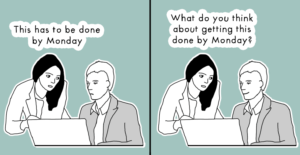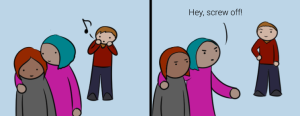(This article has been translated in Farsi here.)
(Trigger Warning: Intimate partner violence)

A friend puts their hands on the shoulders of another friend, who looks sad, consoling them.
Domestic violence, dating violence, relationship violence, intimate partner violence – no matter how we label it’s not something we like to talk about. Or perhaps more accurately, it’s not something we know how to talk about – especially when it’s happening to someone we love.
But it’s really important we learn how to talk about it – in ways that actually help people going through it (which is far more difficult than you may think).
Why is it important to talk about? Because:
- 30% of couples struggle with domestic violence of some sort.
- 1 in 4 women experience domestic violence in her lifetime.
- 1 in 4 gay men experience domestic violence.
- 17-45% of lesbian women report having been the victim of a least one act of physical violence perpetrated by a lesbian partner.
- 74% of Americans personally know someone who is or has been a victim of domestic violence.
In short, you probably know more people experiencing domestic violence than you think.
What Doesn’t Work
So if you see red flags, what can you do to help someone?
Your first instinct may be to tell the victim that what they’re experiencing is domestic violence and they need to get out.
And when they look at you in surprise or act defensive and say “I don’t know what you’re talking about”, you’ll probably be confused or feel upset and insist that they leave.
And when they say they’re not being abused (even though you’ve seen the bruises, heard the insults, and watched their self-esteem crumble) or that they can’t leave, you may throw up your hands in frustration and walk away thinking, “well if they want to stay…”
STOP – Before you go down this very well-intentioned but disempowering path, remember their abuser has probably been working very hard to isolate the victim and destroy their self-esteem and sense of self-worth through emotional, verbal, physical, sexual, financial, and identity abuse.
This can create strong entrenched feelings of shame and embarrassment and often victims of domestic violence try to hide what’s going on from their family, friends, colleagues, and any other supportive person or network – unless the abuser has already driven them away.
And while we know you have good intentions, telling them what they’re experiencing and what they should do about it can further isolate the victim who may or may not be ready to confront their abuse.
It is so important to let the victim determine the next steps, to make their own decisions and take back the power and control over their own lives.
When we make decisions for others, when we try to help them do what they are not ready to do for themselves, we are taking their power and control away from them.
For victims to find the strength and courage to safely navigate away from an abuser, they’re going to need confidence in their power and control over their own story and situation.
And that’s something you can help them with – reflect back to them the power and control they do have and the good decisions they make everyday. This can help them find strength faster.
So how do you have these conversations? They’re not always easy but here’s a list of ways you can support someone you care about to become empowered and take action to escape the abuse.
Get Support from Your Local Domestic Violence Program
Realizing that someone you care about is being abused is tough and knowing how to approach them may seem even more daunting.
Remember, you’re not alone. You can reach out to people’s whose job it is to help people in these situations and lean on their advice.
When you call your local domestic violence program, talk to them about:
- What you can say in the first conversation, especially to better understand what YOU feel comfortable saying. You can even practice with them or role play to make sure you’re not projecting any judgement.
- What the victim can expect if they call a domestic violence hotline. This can help remove any mystery or fear around reaching out for help.
- What rights, options and local resources a victim can access in your area.
- A few basic safety planning tips to help the victim get to a safe place when they can connect with an anti-domestic violence advocate. Safety planning is a tool to help victims think through ways and resources they have to try to mitigate a violent situation. Each safety plan is tailored to the victim’s specific situation and needs.
- How you’re coping with knowing someone you care about is being abused. The impact of abuse isn’t isolated to the victim and can also affect those who care about them. Vicarious trauma is real. So it’s important as you’re supporting them through this situation, that you are also getting support. For survivors of abuse, this is particularly important because it can trigger past trauma, bringing back difficult memories and emotions and leading us to project ourselves into their situation.
Talk To Them For the First Time About the Abuse
The most important thing in such conversations is to communicate your concern without judgment. Let the victim tell their own story and decide their own process.
Remember, no one understands their abuser and their situation better than them. While you may have seen some signs of abuse, there’s probably many things you don’t understand about the relationship that impact how they think and feel.
Instead, focus on creating a space where they can realize their own power and control over their lives and decide what steps they want to take. Remember, this is about them, not you and what you want for them.
Some things to keep in mind during the conversation are:
- Use words that convey concern about their safety without judgment for their relationship or abuser. Asking why they’re staying with such a terrible person will likely cause them to shut down. Instead, use language like, “When I saw X happen, I became concerned about your safety. Have you thought about talking to someone about what you are going through?” or “I’ve heard similar things from other people and I know there are free and confidential hotlines available at any time of the day or night.” This type of language helps them realize they are not responsible for the abusive behavior nor do they have to defend it.
- Reflect their own power and control back to them while showing your support. One example is, “Here are resources when you’re ready. I encourage you to make that call. But I want you to know that this is your situation and you know what is best for you. Is there anything I can do to help?”
- Meet them where they’re at and don’t try to change their mind. What they choose to do should be respected, even if it’s to remain with the abuser. While some want to get out of the situation, some may just want the abuse to end. Abusers are not all one-sided evil people, they are complex human beings and some may have been victims in the past as well. Talking to someone safe about what they’re experiencing, seeking out options for the abusers to address their use of violence, or reporting them to the police are all valid options if that’s what the victim wants. What’s important is that they decide who they reach out to and when.
- Remind them that no one deserves to be abused and that nothing they have done justifies violence against them. Due to the abuse, they may have internalized the batterer’s words that it’s all their fault, that they’re not good enough, that they deserve to be treated this way, and/or that no one else will love them. So reflect back to them that they are good, important, and lovable and deserve better.
- Be a non-judgemental sounding board as they try to figure out what healthy and unhealthy relationships look like, particularly around emotional and verbal abuse. In our society, unhealthy behaviors like name calling and lashing out in anger are normalized. But in healthy relationships, people acknowledge when they make a mistake or did something wrong and apologize – abusers don’t. So help them think through how their partner handles conflict. If the batterer does not acknowledge when they do something wrong and blames their partner for their behavior, it can help the victim see the pattern of controlling behavior.
- Share with them services they can access and how these services can help. Offer your support by accompanying them to a domestic violence organization or be with them when they call a hotline. Remember, don’t push them into doing anything, not only is it controlling and disempowering, they are less likely to follow through.
Support Them through the Long-Haul
Remember, on average it takes 7-13 attempts at leaving before a victim is able to break free from an abusive relationship. And leaving can be the most dangerous time in an abusive relationship and in fact is when most victims are murdered. Leaving takes thoughtful planning, requires established support and needs to be done safely, especially when there are children involved. So your first conversation may not lead to change.
But at least you’ve planted the seed that they deserve better and there are people who can and will help.
Depending on the extent of the damage the abuser has done to their self-esteem and sense of self-worth, it can take a long time for a victim to have the strength to take any action other than what they are already doing to cope with the abuse.
So it’s important that you mange your expectations about the impact of your support. You can’t save anyone but you can be there for them, unconditionally.
Otherwise, you can easily end up feeling frustrated and resentful. It can lead to moments where you want to cry out, “why don’t you just leave?”, “just listen to me and go talk to this organization!”, or even “I spent all this time researching services for you and you didn’t even call me back!”
It’s not uncommon for people to want to rescue others. While it’s well-intentioned, when we try to solve other’s problems for them, we disempower them.
At the same time, supporting someone in an abusive situation can be difficult and scary. As we mentioned already, get support for yourself from the local domestic violence agency. If you’re a survivor, it’s especially important to take care of yourself so you are not triggered and reliving your own trauma history.
If You Remember Nothing Else
If all this seems overwhelming, remember these words, “No matter what you decide to do, I will support you and I will be here for you whenever you need me.”
Or if you can’t or don’t want to say that, how about, “There are free and confidential services that can help you any time of the day or night. You are not alone.”
With these words, you’ve respected their autonomy and reflected back that you trust them to make the best decision for themselves.
And if you say this often enough, it may rise above the abuser’s voice long enough for them to take action to end the abuse.
Resources
- National Domestic Violence Hotline: 1-800-799-SAFE
- Organizations Serving Domestic Violence Victims per US State
- Domestic Violence Resources for the LGBTQ Community
- The Verbally Abusive Relationship: How to Recognize It and How to Respondby Patricia Evans
This article was written in collaboration with Liz Odongo, the Training and Outreach Director at the DC Coalition Against Domestic Violence (DCCADV). DCCADV engages the community to support survivors, address systems gaps, and implement sound and empowering initiatives. Liz is responsible for designing, facilitating and evaluating training opportunities for Coalition Members, law enforcement, government agencies and community-based organizations. Follow onFacebook and Twitter.
Sandra Kim is the Founding CEO & Co-Publisher of Everyday Feminism. She brings together her personal and professional experience with trauma, personal transformation, and social change and gives it all a feminist twist.
Search our 3000+ articles!
Read our articles about:
Our online racial justice training
Used by hundreds of universities, non-profits, and businesses.
Click to learn more




















